A study was conducted at Institute of Agriculture Research and Training, Ibadan in 2015 and 2016 to investigate the effect and profitability of selected weed management methods on weeds, kenaf growth and yield. Ibadan is a rainforest-savanna transition agro-ecology. Seven treatments were applied, viz. weed-free control, weedy control, pre-emergence herbicide (metolachlor 1.44kg active ingredient/ hectare (a.i/ha) + hoe weeding at 4 weeks after planting (WAP), Citrullus lanatus (melon) cover + hoe weeding (4 WAP), sweet potato cover + hoe weeding (4 WAP), mulch cover (Panicum maximum) + hoe weeding (4 WAP) and two hoe weeding regimes at 4 and 8 WAP. Results showed that weed-free treatment had the tallest kenaf plant height, widest butt girth and greatest number of leaves in both years of trail. Dissimilarity to other treatments in plant height, butt girth, number of leaves, canopy cover, and core yield was found in weedy control which had the least value for these parameters throughout the study. However, butt girth was comparable across treatments applied except the weedy control. With the exception of weedy control and weed-free, other treatments had kenaf plants with similar canopy width which were significantly greater than that of weedy control and significantly less than that of weed-free treatment. Relative to weedy control, other weed management treatments had a significantly reduced weed dry weight and weediness. Kenaf plant height had significant positive correlation with butt girth, bast fibre, core fibre, canopy cover and weed control rate. However, weed biomass and weediness had significant negative correlation with kenaf traits measured. Partial budgeting analysis showed that Net income (NI) in bast fibre was highest in weed free (N3,608, 324.00/ha = US$12, 027.75/ha) and lowest net income (NI) was recorded in weedy control (N437, 098.25/ha = US$1, 456.99/ha).
Keywords: Cover Crop, Kenaf Production, Profitability, Weed management

